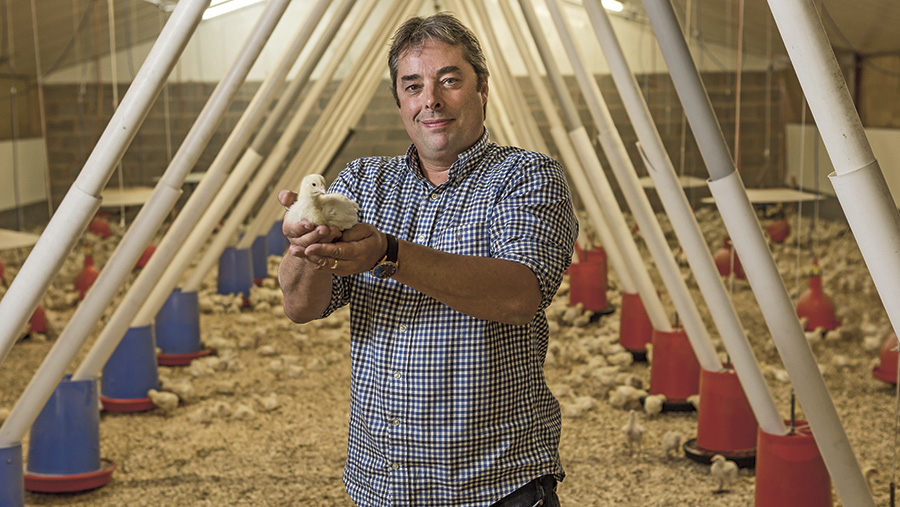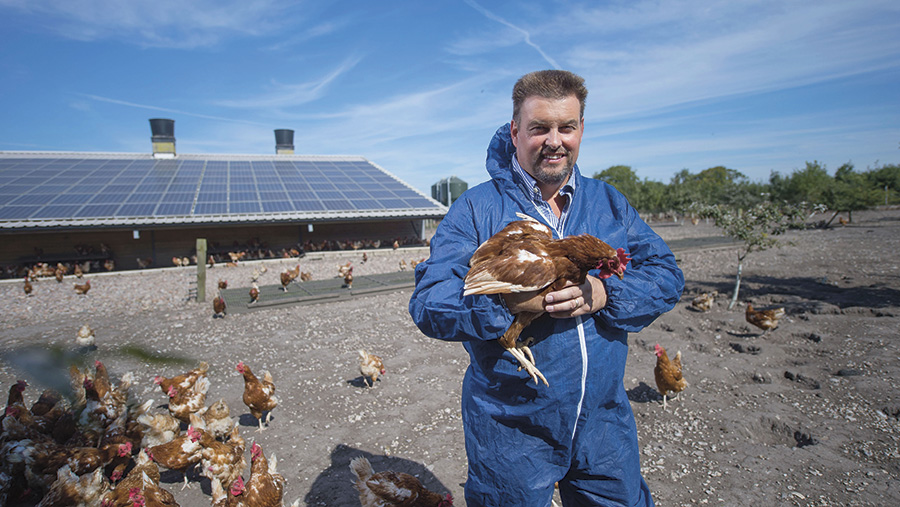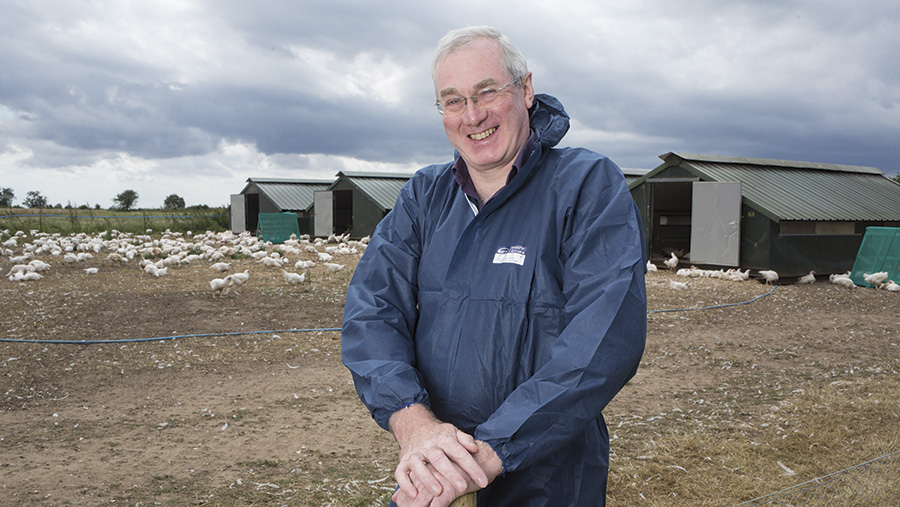2016 Farmers Weekly Awards: Poultry Farmer of the Year finalists revealed
The Farmers Weekly Awards celebrate the very best of British farming by recognising and rewarding innovation, hard work and passion for agriculture.
All three finalists have displayed business acumen, the highest standards of animal husbandry and a drive to succeed. They are examples of the poultry industry at its best. Jake Davies reports.

From left: Robert Caldecott, Ken Cottey and Harry Irwin
See also: Keep up the the latest from the 2016 Farmers Weekly Awards
Robert Caldecott
Wythall, Worcestershire

Robert Caldecott took the decision to sell under his own brand as a way to distinguish his product © Richard Stanton
Steady expansion and learning from his peers has seen Robert Caldecott grow his business from a few geese for Christmas to a supplier of premium poultry to some of the finest kitchens in the land.
Caldecott Turkey Farms is a major producer of birds destined for butchers, wholesalers and restaurants for the Christmas trade, but also rears some 4,200 free-range chickens a week for similar markets.
The product is pitched as a solid middle market offering – a premium, high-quality bird without pricing out the majority of consumers that occasionally want to spend a bit more, rather than something ultra-expensive and organic, for example.
The judges liked
Meticulous control of costs and marketing
Solid business built up through sensible, organic growth
Developing an added-value offering that doesn’t cost the earth
The turkeys and chickens sold are effectively a retail butcher’s bird.
Where Robert has been successful is in growing sales in a market that has moved away from British whole birds to portions and imports – a frustration that any turkey farmer will be familiar with.
It is reflected in his relationship with suppliers. While highly selective about who he sells to, once he decides to supply a customer, he says: “I never want to lose them”.
Indeed, some customers have been with him since the beginning.
One major order came last year, when a larger producer decided to focus on retail – the company’s wholesale business was offered to Robert on the back of his solid reputation.
About 15 wholesalers serving 400 butchers take the bulk of output.
In addition, 80 butchers are supplied directly, the Royal Windsor Farm Shop having the highest profile.
High-end wholesaler Aubrey Allen – holder of a royal warrant – has a close partnership with Robert, who hosts open days for the business to highlight its poultry sourcing.
Farm facts
Major producer of seasonal turkey and year-round business offering free-range chicken
Poultry grown on owned and contracted sites across Worcestershire and beyond
Birds predominantly sold under Robert’s own name
Key staff responsible for running farms and slaughterhouse
Well-developed plans for succession
Despite a focus on long-term partnerships, no one customer takes more than 25% of the business, one example of Robert’s cautious, methodical approach.
And an important consideration is selling under his own brand to distinguish his product.
Buying in raw materials and sales and marketing form Robert’s main tasks throughout the day, while experienced, well-paid managers oversee the farms and slaughterhouse.
That man looking after agriculture has spent a quarter of a century with the business.
Alongside an attractive salary comes 12ha rent-free, on which he breeds sheep as a hobby.
His slaughterhouse manager takes responsibility for seasonal recruitment, and is part of a team of three for most of the year.
Robert’s customers are diverse, the business mature, and owned farms are selected with the view that they may not be suitable for poultry rearing forever.
Indeed, so close to Birmingham, some could one day be repurposed if required.
It is a shrewd approach, born out in Robert’s ability to tell you exactly how much every raw material has cost the business.
He is also a fervent bargain hunter, and will happily tell you how much larger pieces of equipment should have cost, and how much he paid.
The way Robert does things is clearly informed by his early years.
He grew up in what was then one of the most poultry-dense parts of the country, Wythall, near Birmingham.
Even as a five-year-old, he was keen to keep a few birds, and would wander to a neighbouring farm to watch chickens laying eggs.
That early fascination soon translated to gainful employment in the form of hard, dirty work on a neighbouring egg farm, before his father bought a small egg operation himself when Robert was a teenager.
Leaving school at 15 to help on the egg farm full time, Robert soon began a sideline in goose production at Christmas.
It was this which evolved into the business that exists today, but some hard lessons were learned between then and now.
In the mid-1980s egg farming went through a difficult period.
There was oversupply, imports from France and supermarkets began to pop up and squeeze farmgate prices.
The real bombshell came when then health secretary Edwina Currie sparked the salmonella in eggs scare, which all but eliminated sales overnight.
The small family egg farm struggled to generate enough cash to pay the bills. “That is still imprinted in me now. You never know when the rain is going to arrive.”
It means he keeps a healthy cash reserve in the company to this day, and has a succession plan tied up that could take the business in a number of different directions.
Robert has taken heed of the poultry sector’s successes and failures over his long career and applied lessons appropriately.
These include not overstretching, keeping a close eye on costs, and seeking a premium product over mass production.
He has these attributes down to a fine art.
“After seeing what went on with other farms, I’ve tried to take a leaf out of everybody’s book, and do that little bit better.”
Ken Cottey
Chard, Somerset

After a career in engineering was cut short, Ken Cottey invested in poultry farming on his small Somerset farm © Jim Wileman
From free-range producers to packing eggs on behalf of 18 other farms, the 13 years Ken Cottey has been in egg production have been a whirlwind.
Ken’s family dairy farm didn’t seem set for a successful future in farming.
At just 16ha and perched 1,000ft up on the Blackdown Hills – not to mention being in an area of outstanding natural beauty – there wasn’t an immediately obvious way to create a sustainable business.
Then, like now, milk prices weren’t great. Add to that his first career, as an engineer, was cut short because of injury.
The judges liked
Sheer grit and determination to turn around an uneconomical family farm
Hard work has seen Ken continually overcome setbacks
Business showing strong growth potential
So faced with a farm unsuitable for almost any form of modern agriculture and a blank slate, Ken turned to poultry – and has made a great success of it since.
Free-range egg units were built up in quick succession. First a 6,000-bird unit in 2003, with a second going up a year later.
In 2007 the third house – a 16,000-bird multi-tier unit – went up. It was one of the first such systems brought over from Europe. While commonplace these days, it affords birds perches at different levels and removes manure automatically, resulting in a better shed atmosphere.
Through bank finance and sheer grit, Ken had transformed the bleak, but beautiful, windswept farm into a profitable enterprise.
The story only begins here.
At the time eggs were sold “all in” to a national packer – it meant feed and pullets had to be bought exclusively from that business and almost all eggs sold back to it.
“We felt we weren’t in control,” says Ken.
There came a point when both the feed bill and egg price weren’t where they should have been.
“We made a decision, scary as it was, to go it alone.”
A year’s notice with their packer was cut short, and Ken found himself with the prospect of nearly 30,000 eggs being produced every day with no end market.
That determination that led to early success came through once again.
“We started calling and emailing anyone and everyone who might want some eggs; supermarkets, shops, nursing homes, pubs.”
There was a local egg round in place, but it was not enough.
“Then we had a stroke of luck,” says Ken.
Farm facts
Producing and packing eggs for supermarkets, wholesalers, farm shops and local restaurants
30,000 birds at the home farm, with a further 18 farms supplying the pack house
Sales under own brand and under retailers’ colours
Dairy sheds repurposed into food-grade pack house
Out of the blue, a buyer from Aldi got in touch, and asked if they could fill a commitment after being let down by another egg packer.
Within two weeks Ken had British Lion accreditation, an antiquated Ben Nevis grader, and was selling eggs to a major supermarket.
“We did silly hours, but got the orders out,” he explains.
It was then that things truly started to rocket, and the transformation from a small farm into a food business began.
In 2014, Ken gained planning permission to convert the old dairy sheds into a food-grade packing centre – not just for his own hens, but for those of 18 other farmers.
His new headquarters can process 170 cases of eggs an hour. The new boardroom takes advantage of the panoramic views of the surrounding countryside – the same view that the dairy cows used to enjoy.
That new operation has focused on high standards.
An A-grade British Retail Consortium accreditation is no easy thing to achieve, and the British Egg Industry Council and RSPCA’s Freedom Food have both given their stamp of approval.
These standards were given a lift as the firm was recruiting just as the nearby Dairy Crest creamery closed, meaning a number of experienced staff found themselves looking for work. Employing locally is clearly important to Ken.
Continual upgrades are planned for the business.
A major investment this year will be a plastic pallet washer, allowing disposable fibre trays to be phased out.
Another recent investment is software that will allow Ken to track farm production to inform throughput.
A huge amount of work goes into this business, which has shown extraordinary growth since Ken came back to the farm without knowing how it was ever to make his family a living.
Today, Blackdown Hills Westcountry Eggs still counts Aldi as a major customer, but it also supplies into Asda, Morrisons, food service and wholesale, while a local egg round remains intact.
Looking to the future, Ken has a huge range of options.
Egg processing may be a route in the coming years, helping to add value. But the priority, he says, is continuing to grow by employing a combination of passion, hard work and a little luck.
Harry Irwin
Attleborough, Norfolk

Harry Irwin is one of a handful of people with businesses in both poultrymeat and eggs © Tim Scrivener
While the poultry industry is often considered a single entity in itself, not many can claim to have a hand in both meat and egg production.
One example is Harry Irwin, who has built a successful business supplying free-range chicken to Tesco and more recently set up a separate enterprise packing eggs in East Anglia.
Hailing from a dairy background in Northern Ireland, it was a long career in farming that brought Harry to the position he finds himself in today.
He studied agriculture in Newcastle before working as a silage specialist selling inoculants mainly to feed companies.
The judges liked
Highly experienced operator with calm control of two large businesses
Close collaboration with customers to keep orders correct and working relationships relevant
Feeds into industry discussions, with involvement on several technical boards
He ended up working for one of the feed companies, Marston’s. It was a private firm dealing in dairy beef and quite a lot of poultry, says Harry.
He worked in sales, but staffing problems saw him taking on feed formulations – thrown in at the deep end, as Harry puts it.
The deep end only got deeper, as Marston’s was sold to BOCM Pauls, leaving him in charge of that operation as a cog in a very large machine.
His next move was the first formal step into the poultry industry, joining Daylay Eggs, then part of food business Hillsdown Holdings.
And after a spell there he took an agricultural director role at Buxted Chicken.
Eventually, Hillsdown decided to divest its operations, splitting up its business and selling Buxted to 2 Sisters Food Group.
So with experience in feed, poultrymeat and egg production, he was well placed – after a period as agricultural director for 2 Sisters – to set up his own enterprise.
First came free-range chicken, in an independent, but close, tie-up with Tesco and 2 Sisters.
“I was of the view that free-range chicken would grow in the same way that the egg market has.
“Because of that, and because I wanted to be my own boss, I left.”
It was with the blessing of 2 Sisters, and for a time under an exclusive supply arrangement.
Farm facts
Two businesses producing free-range chicken and eggs
Some 68 small farms producing poultrymeat for retailers
About 650,000 hens laying eggs under contract throughout East Anglia
That business today comprises 68 small farms, with birds generally housed in mobile units, and diversifications into guinea fowl and other speciality breeds.
It has grown over its 13 years from 50,000 birds a week to 165,000 a week.
For the first six years the market did indeed grow very quickly. At about 20% a year, in fact.
“At first we were playing catch-up,” says Harry.
But in 2008, when recession hit, speciality poultry was hit hard. The organic market collapsed and two-thirds of overall volume was cut back.
“It was a painful time,” he admits.
The key to success was flexibility – one benefit of operating smaller sheds is that orders can be decided far faster than a business with fixed shed space that must be filled to be economical.
“Through the recession, we continued to grow – not because the market has grown, but because we were able to take on more business.”
That steady growth informed Harry’s diversification, acknowledging that perhaps free-range chicken may never become as mainstream as the equivalent eggs have.
With a partner he set up the packing station on a business park in Attleborough, Norwich, and recruited three farming families as additional directors.
But everything was in place before the new company had a single order from a retailer.
Tesco took an unprecedented step in taking on a new supplier in a mature, consolidated market. Harry’s strong relationship with the retailer must have played a part in the decision.
“I have to say, [Tesco] have been incredibly supportive of what we are trying to so – and that has put the pressure on us to make sure everything is as it should be.”
This close relationship allows Tesco to trial initiatives with one of its smaller packers before rolling programmes out to its wider supply chain – and is testament to the collaborative approach Harry takes to doing business.
Today Anglia Free Range Eggs packs the eggs of some 650,000 birds and recently won an early contract to work with Amazon Prime. Rigorous standards and top staff in key appointments are both high on Harry’s list of priorities.
He is widely known across the poultry industry, a Nuffield scholar and involved with the Red Tractor technical board and the British Egg Industry Council – and was recently named a “Food Pioneer” by the then Defra secretary, Liz Truss.
The principles of big business – benchmarking, group bargaining, good relationships with partners – are all applied to Harry’s own enterprises to great success.
With the chicken business entering a more mature phase and the egg packers showing strong growth, there is an exciting future ahead for both.
Sponsor’s message
The 2016 Farmers Weekly Awards Poultry Farmer of the Year award is sponsored by Elanco.
 “This year’s finalists epitomise the collaboration and innovation that makes the poultry sector the success it is. Each has drawn on the expertise of their peers, while ensuring they have key colleagues in place, to achieve top bird and business performance”
“This year’s finalists epitomise the collaboration and innovation that makes the poultry sector the success it is. Each has drawn on the expertise of their peers, while ensuring they have key colleagues in place, to achieve top bird and business performance”
George Gould
Elanco’s poultry technical consultant
